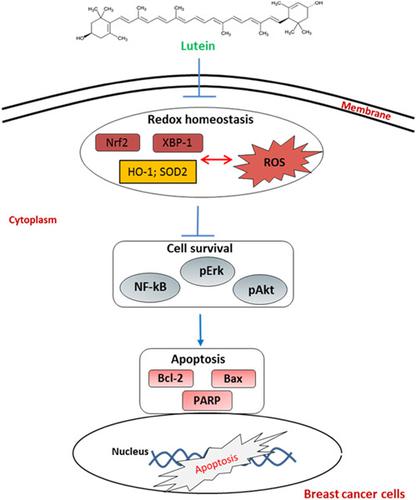当前位置:
X-MOL 学术
›
J. Cell. Physiol.
›
论文详情
Our official English website, www.x-mol.net, welcomes your
feedback! (Note: you will need to create a separate account there.)
Lutein inhibits breast cancer cell growth by suppressing antioxidant and cell survival signals and induces apoptosis.
Journal of Cellular Physiology ( IF 4.5 ) Pub Date : 2020-07-24 , DOI: 10.1002/jcp.29961 Yogendra Prasad Kavalappa 1, 2 , Sowmya Shree Gopal 1, 2 , Ganesan Ponesakki 1, 2, 3
Journal of Cellular Physiology ( IF 4.5 ) Pub Date : 2020-07-24 , DOI: 10.1002/jcp.29961 Yogendra Prasad Kavalappa 1, 2 , Sowmya Shree Gopal 1, 2 , Ganesan Ponesakki 1, 2, 3
Affiliation

|
Reduced risk of breast cancer upon intake of lutein‐rich food supplements creates an interest to investigate the molecular mechanism underlying the growth inhibitory potential of lutein in MCF‐7 and MDA‐MB‐231 cells. Lutein purified from Spinacia oleracea was identified by high‐performance liquid chromatography and liquid chromatography–mass spectrometry. The cell viability was measured by water‐soluble tetrazolium‐1 assay. The intracellular reactive oxygen species level was examined by 2′,7′‐dichlorofluorescein assay. The protein expression of the markers of antioxidant defense, cell survival, and apoptosis was analyzed by western blot analysis. The induction of apoptosis by lutein was measured by 4′,6‐diamidino‐2‐phenylindole staining and caspase‐3 activity assay. The purified lutein inhibited the viability of MCF‐7 and MDA‐MB‐231 cells. The growth inhibitory effect of lutein was associated with suppressed protein expression of superoxide dismutase‐2 and heme oxygenase‐1, and its transcription factor nuclear factor erythroid 2‐related factor‐2. Lutein treatment subsequently blocked the expression of intracellular cell survival proteins, phosphorylated protein kinase B, phosphorylated extracellular‐regulated kinase 1/2, and nuclear factor‐kB. Suppression of antioxidant defense and cell survival markers by lutein was further linked to apoptosis induction with elevated caspase‐3 activity and downregulated expression of Bcl‐2 and poly‐ADP ribose polymerase. Our results emphasize a significant role of lutein as an effective inhibitor of human breast cancer cell growth that activates cell death partly through the modulation of antioxidant defense response‐linked cell survival signaling markers.
中文翻译:

叶黄素通过抑制抗氧化和细胞存活信号并诱导细胞凋亡来抑制乳腺癌细胞的生长。
摄入富含叶黄素的食品补充剂可降低患乳腺癌的风险,这引起了研究叶黄素在 MCF-7 和 MDA-MB-231 细胞中抑制生长潜力的分子机制的兴趣。从菠菜中纯化的叶黄素经高效液相色谱法和液相色谱-质谱法鉴定。通过水溶性四唑鎓-1测定法测量细胞活力。通过2',7'-二氯荧光素测定检查细胞内活性氧水平。通过蛋白质印迹分析分析抗氧化防御、细胞存活和细胞凋亡标志物的蛋白质表达。通过 4',6-二脒基-2-苯基吲哚染色和 caspase-3 活性测定来测量叶黄素对细胞凋亡的诱导。纯化的叶黄素抑制 MCF-7 和 MDA-MB-231 细胞的活力。叶黄素的生长抑制作用与抑制超氧化物歧化酶 2 和血红素加氧酶 1 及其转录因子核因子类红细胞 2 相关因子 2 的蛋白质表达有关。随后叶黄素处理阻断了细胞内细胞存活蛋白、磷酸化蛋白激酶 B、磷酸化细胞外调节激酶 1/2 和核因子-kB 的表达。叶黄素对抗氧化防御和细胞存活标志物的抑制进一步与细胞凋亡诱导相关联,其中 caspase-3 活性升高以及 Bcl-2 和聚 ADP 核糖聚合酶的表达下调。我们的结果强调了叶黄素作为人类乳腺癌细胞生长的有效抑制剂的重要作用,其部分通过调节抗氧化防御反应相关的细胞存活信号标记来激活细胞死亡。叶黄素对抗氧化防御和细胞存活标志物的抑制进一步与细胞凋亡诱导相关联,其中 caspase-3 活性升高以及 Bcl-2 和聚 ADP 核糖聚合酶的表达下调。我们的结果强调了叶黄素作为人类乳腺癌细胞生长的有效抑制剂的重要作用,其部分通过调节抗氧化防御反应相关的细胞存活信号标记来激活细胞死亡。叶黄素对抗氧化防御和细胞存活标志物的抑制进一步与细胞凋亡诱导相关联,其中 caspase-3 活性升高以及 Bcl-2 和聚 ADP 核糖聚合酶的表达下调。我们的结果强调了叶黄素作为人类乳腺癌细胞生长的有效抑制剂的重要作用,其部分通过调节抗氧化防御反应相关的细胞存活信号标记来激活细胞死亡。
更新日期:2020-07-24
中文翻译:

叶黄素通过抑制抗氧化和细胞存活信号并诱导细胞凋亡来抑制乳腺癌细胞的生长。
摄入富含叶黄素的食品补充剂可降低患乳腺癌的风险,这引起了研究叶黄素在 MCF-7 和 MDA-MB-231 细胞中抑制生长潜力的分子机制的兴趣。从菠菜中纯化的叶黄素经高效液相色谱法和液相色谱-质谱法鉴定。通过水溶性四唑鎓-1测定法测量细胞活力。通过2',7'-二氯荧光素测定检查细胞内活性氧水平。通过蛋白质印迹分析分析抗氧化防御、细胞存活和细胞凋亡标志物的蛋白质表达。通过 4',6-二脒基-2-苯基吲哚染色和 caspase-3 活性测定来测量叶黄素对细胞凋亡的诱导。纯化的叶黄素抑制 MCF-7 和 MDA-MB-231 细胞的活力。叶黄素的生长抑制作用与抑制超氧化物歧化酶 2 和血红素加氧酶 1 及其转录因子核因子类红细胞 2 相关因子 2 的蛋白质表达有关。随后叶黄素处理阻断了细胞内细胞存活蛋白、磷酸化蛋白激酶 B、磷酸化细胞外调节激酶 1/2 和核因子-kB 的表达。叶黄素对抗氧化防御和细胞存活标志物的抑制进一步与细胞凋亡诱导相关联,其中 caspase-3 活性升高以及 Bcl-2 和聚 ADP 核糖聚合酶的表达下调。我们的结果强调了叶黄素作为人类乳腺癌细胞生长的有效抑制剂的重要作用,其部分通过调节抗氧化防御反应相关的细胞存活信号标记来激活细胞死亡。叶黄素对抗氧化防御和细胞存活标志物的抑制进一步与细胞凋亡诱导相关联,其中 caspase-3 活性升高以及 Bcl-2 和聚 ADP 核糖聚合酶的表达下调。我们的结果强调了叶黄素作为人类乳腺癌细胞生长的有效抑制剂的重要作用,其部分通过调节抗氧化防御反应相关的细胞存活信号标记来激活细胞死亡。叶黄素对抗氧化防御和细胞存活标志物的抑制进一步与细胞凋亡诱导相关联,其中 caspase-3 活性升高以及 Bcl-2 和聚 ADP 核糖聚合酶的表达下调。我们的结果强调了叶黄素作为人类乳腺癌细胞生长的有效抑制剂的重要作用,其部分通过调节抗氧化防御反应相关的细胞存活信号标记来激活细胞死亡。











































 京公网安备 11010802027423号
京公网安备 11010802027423号